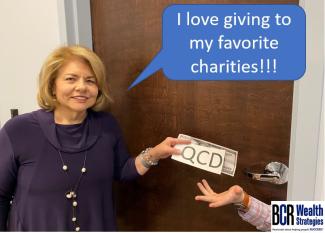
Qualified Charitable Donation from your Required Minimum Distribution
Be Smart with Your Money – Make your Charitable Donations from your Required Minimum Distribution (RMD) using a Qualified Charitable Donation (QCD). This is a tax efficient way to use your RMD to make charitable donations and get the biggest tax bang for your charitable buck.
Beginning January 2020, the IRS requires taxpayers over age 72 to start taking a Required Minimum Distribution (RMD) from their IRAs each year. This forced IRA distribution adds taxable income to your annual income tax return, increasing the amount of taxes you pay to Uncle Sam at the end of the year.
Your charitable donations are generally a tax deduction on your income taxes. With the increased standard deduction for 2020, $12,400 for individuals and $24,800 for married couples filing jointly, your charitable donations will not reduce your taxable income unless your itemized deductions exceed the standard amounts.
Any amount given to a charity using a QCD will count towards your IRA’s annual RMD but will not be included in your taxable income. The reduction in income is more beneficial to you for tax purposes than the tax deduction.
This means the tax benefit from a QCD can be realized by all individuals – whether you take the standard deduction or itemize deductions.
In addition to reducing your federal taxes, here are some additional benefits from using a QCD to reduce your adjusted gross income (AGI):
- A lower AGI may trigger a reduction in taxable Social Security benefits
- A lower AGI may trigger a reduction in future Medicare premiums
- Lowering your AGI can help increase other potential itemized deductions, such as medical expenses or miscellaneous deductions that are limited to a percent of your AGI
To make a QCD, you must be in RMD phase. A QCD must go directly from the IRA to the qualified 501(c)3 organization.
Make sure you keep records on your QCD that you receive from the charities to use in preparing your tax return next year, as the custodian will issue a 1099 to you for the full RMD.
We recommend discussing the potential benefits of a QCD with your financial/tax advisor. A review of your unique circumstances and long-term financial goals should be evaluated to determine whether a QCD is a good gifting strategy for you.
-Sandra Cleveland and Harold Sasnowitz-

